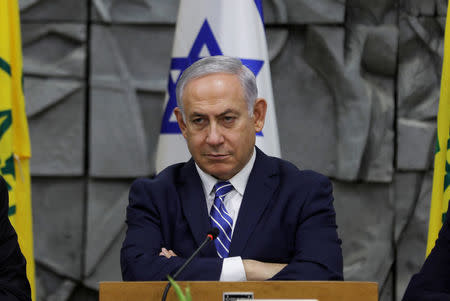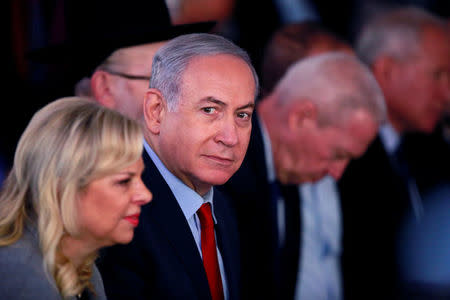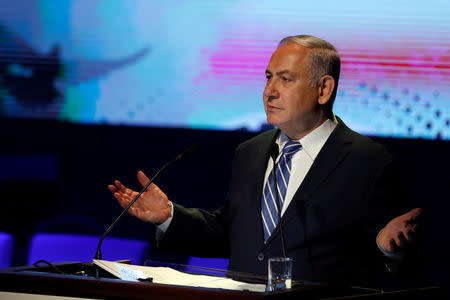Israeli police question Netanyahu in telecom corruption case
JERUSALEM (Reuters) - Israeli police questioned Benjamin Netanyahu on Monday over his alleged dealings with the country's largest telecommunication company, a police spokesman said, one of three corruption cases weighing on the prime minister's political future. It was the second time Netanyahu has been questioned in the investigation into allegations he awarded regulatory favours to Bezeq Telecom Israel in return for favourable coverage on a news site the company's owner controls. Netanyahu and Bezeq have denied wrongdoing. Netanyahu's wife and son were also questioned for a number of hours, police spokesman Micky Rosenfeld said. Israeli media said that was in connection to their relationship with Bezeq's owner and his spouse. After the session with police, Netanyahu issued a video on social media in which he said he was certain he would be cleared. "I am sure that after this meeting, and like all the other meetings, there will be nothing, because there was nothing," he said. Two former Netanyahu confidants have agreed to turn state's witness in the case. One is Shlomo Filber, the former director general of the Communications Ministry; the other is Nir Hefetz, a former Netanyahu spokesman. Police have yet to make a recommendation about charges in the case. In the two other cases in which police have already recommended that Netanyahu be charged with bribery, the final decision about whether to prosecute rests with the Israeli attorney general. That decision could be months away. In the first investigation, known as Case 1000, he is suspected of bribery over gifts from wealthy businessmen, which police say were worth nearly $300,000. The other, Case 2000, involves an alleged plot to win positive coverage in Israel’s biggest newspaper by offering to take measures to curtail the circulation of a rival daily. So far, partners in Netanyahu’s governing coalition have stood by him, saying they are awaiting the attorney general’s next moves. Political analysts say such support may erode if the investigations against Netanyahu intensify. Netanyahu could also call a snap election to try to stall legal proceedings during the campaign and rally his right-wing power base behind him. Recent polls show Netanyahu’s Likud ahead of other factions in the Knesset. However, surveys also show that about half of Israelis believe the police over Netanyahu and think he should step down. A third think he should remain in office. (Reporting by Maayan Lubell and Ori Lewis; Editing by Larry King and Robin Pomeroy)




